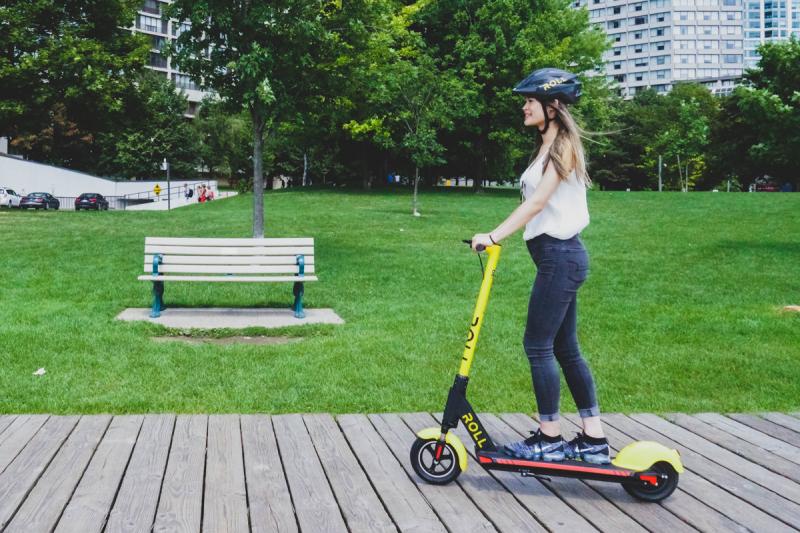August 2, 2019 | Alumni
E-scooter startup by U of T alumnus set to roll out in Kelowna, B.C.
By Alexa Battler

A woman rides a Roll brand e-scooter in Toronto (photo courtesy of Roll Technologies)
A University of Toronto startup is racing toward its goal: to introduce electric scooters (e-scooters) in a way that is safe, legal and tailored to Canada.
Roll Technologies Inc., whose CEO is U of T Scarborough alumnus Richard Cao (BBA 2019 UTSC), has reached a deal with the city of Kelowna, B.C., believed to be the first city in Canada to welcome a program of e-scooters. The startup will deploy 200 e-scooters and 50 electronic bikes (e-bikes) in September. Users will be able to find, unlock and rent the scooters via Roll’s app.
“E-scooters are a popular and effective form of shared mobility – and one that provides a green solution to a common urban transportation problem,” says Cao, who is from Shanghai and graduated from U of T Scarborough's management program in June.
“I want to provide a reasonable product to the market that people actually need and can use in a safe way.”
E-scooters appeared in the U.S. in September of 2017, but problems arose when they were made available without extensive instructions, helmets or invitations from government bodies. Injuries, deaths and public backlash were rampant through 2018 and have continued in 2019.
“Canadian governments have been very conservative with e-scooters to minimize the risks – it’s a good thing, and one of the reasons American companies haven’t gotten into this market as quickly,” Cao says.
Cao’s father works in the Chinese manufacturing industry and has been making e-bikes and e-scooters for U.S. companies. This gave Cao the idea and connections to begin building a competitive startup.
The Hub at U of T Scarborough helped Cao launch his startup
In March, Cao went to The Hub, U of T Scarborough’s entrepreneurial incubator, and began working with its director, Gray Graffam (MA 1984, PhD 1990).
“What I’m trying to do is differentiate him straight up from what the other companies are doing,” Graffam says. “I’m introducing him to various politicians and governing agencies to say, ‘How can I work with the city to introduce these e-scooters in a safe way?’”
Cao built a team of six, and Roll has now launched its website, coded its app and crafted its bright yellow e-scooter.

The platform of Roll’s e-scooter is wider and heavier than those of major U.S. companies in an effort to make them more stable. The wheels are also larger, to help prevent them from getting caught in curbs or uneven street surfaces.
A study of e-scooter use in Austin, Texas by the Centers for Disease Control and Prevention (CDC) found that about 20 people were injured per 100,000 e-scooter trips, with half of those injured sustaining head injuries.
The study noted head injuries could have been prevented by wearing a helmet, but only one of the 190 injured people in the study was wearing one. That’s why Cao is making wearing a helmet mandatory for all users, and is launching a free helmet program.
The same study found that one-third of injured users were harmed on their first time riding an e-scooter. So, Roll’s app will identify first-time users and lock the e-scooters into a lowered speed.
Roll is also working to make sustainability a priority, because while the scooters may seem eco-friendly, a short lifespan can send them on a fast track to the landfill.
That’s why Cao has made durability a focus in his design. Part of Roll's daily operations will be investigating scooters and making every effort to repair them instead of replacing them.

